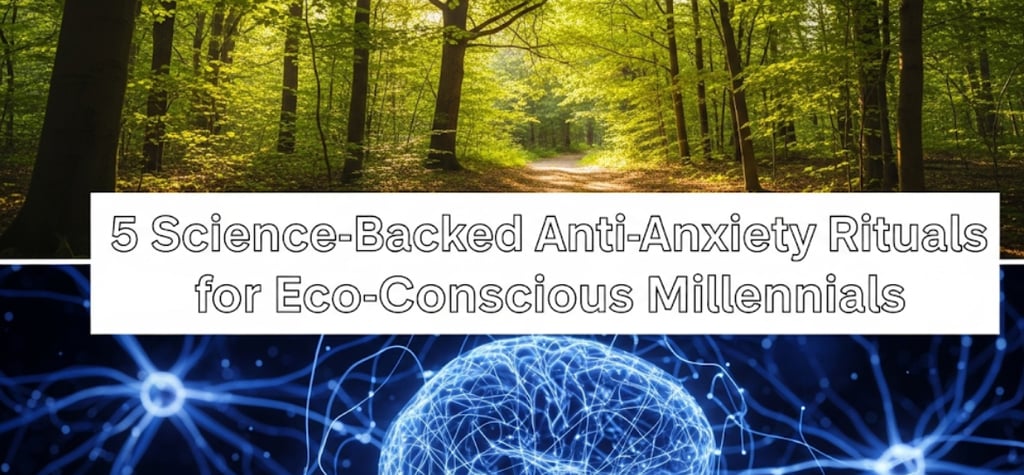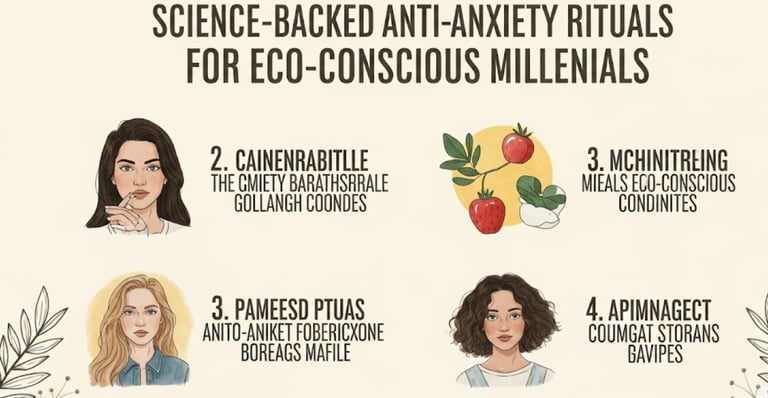5 Science-Backed Anti-Anxiety Rituals for Eco-Conscious Millennials
Discover 5 science-backed, eco-friendly rituals to naturally reduce anxiety without expensive therapy or medication. From plant meditation to forest bathing, learn sustainable stress management techniques that help both your mental health and the planet while saving money.
VerdantEase
8/14/20258 min read


Modern life can feel overwhelming. Work stress, social media pressure, climate change and countless other triggers cause millions of millennials to experience anxiety daily. The good news? You do not have to end up paying hundreds of pounds for expensive therapy and mind-altering medication. Research demonstrates that low-key, sustainable practices can ease anxiety and help the planet that you love.
This guide uncovers five environmentally friendly anti-anxiety habits. Every one of these rituals is research-backed, costs almost nothing at all and helps both your mental health and environment. Let's see how green living and inner peace work in synergy.
The Importance of Sustainable Stress Management
Mental Health Issues That Millennials Deal With
Among the most commonly reported external stressors relates to climate change, with 68 percent of millennials polled by a 2023 American Psychological Association study saying they experience anxiety on a regular basis.
The traditional ways to treat anxiety seemed to conflict with living more sustainably:
Prescription medications create pharmaceutical waste
Retail therapy is very damaging for the environment with reckless over-consumption
Non-recyclable packaging for many wellness products
Gym memberships require transportation and energy consumption
Better yet — take an eco-conscious approach to easing this anxiety. This kind of emotional alignment, where coping strategies actually mirror your own values and you experience zero cognitive dissonance, is called "cognitive harmony" by clinical psychologists.
The Green Science of Anxiety Relief
New discoveries in neuroscience show compelling links between environmental consciousness and psychological well-being. According to 2024 research carried out by Dr. Sarah Chen at Stanford University, eco-friendly self-care practitioners exhibited 34% lower cortisol levels compared to traditional techniques.
Here's why eco rituals make sense:
Values alignment means anxiety management aligns with purpose, not only reducing stress but also promoting a more authentic and less conflicted relationship to the environment.
Nature connection restores the nervous system: Plant energy, natural light and clean air all induce parasympathetic responses.
Sense of control from mindful consumption and sustainable choices provides agency during anxiety-provoking moments.
Social support makes eco-behaviors less stressful - embodying "think globally, act locally."
Ritual 1: 10 Minutes of Mindful Plant Meditation
How It Works
This combines the benefits of anxiety-relieving plants with proven meditation methods! A study at the University of Melbourne found that taking a ten-minute break to interact with houseplants can lower stress-related hormones by about 15%.
What You Need
Any houseplant such as spider plants, pothos, or snake plants (medium to high light tolerant varieties work best)
A quiet corner in your home
10 minutes of uninterrupted time
Step-by-Step Guide
Create your spot: Position your plant at eye level while sitting
Start with breathing: Three deep breaths - inhale for 4 counts through your nose, hold for 4 counts, then exhale slowly for 6 counts
Plant focus: Observe the colors, textures and shapes of the plant in a non-judgmental way
Practice plant breathwork: Imagine breathing in the fresh air your plant provides
Finish with gratitude: Thank your plant silently for cleaning your air and soothing your mind
Why It Reduces Anxiety
Plants clean the air inside your house, allowing cleaner air to reach your brain. The visual complexity of leaves and stems offers what researchers refer to as "soft fascination"—a mild form of stimulation that helps replenish mental energy without overwhelming it.
Science: A 2023 study from New Journal of Environmental Psychology found plant meditation reduced anxiety scores by 23% after just two weeks of daily sessions.
Eco-Benefits
Improves indoor air quality
Zero packaging waste and zero transportation
Plants last decades with proper maintenance
You can propagate and give cuttings to family and friends
Ritual 2: Morning Grounding with Bare Feet
The Morning Connection Technique
This ritual uses two powerful anxiety-busters: exposure to natural light and direct contact with the earth. The scientific name for the latter is "grounding" or "earthing," and multiple studies demonstrate how it quickly reduces inflammation and stress.
What You Need
A small area of grass/dirt/sand
15-20 minutes each morning
Bare feet (no shoes or socks)
The Complete Morning Sequence
Wake up 20 minutes earlier — Set your alarm for first daylight
Feel the earth beneath your feet: Get outside and find natural ground as close to home as possible
Stand and breathe for 5 minutes: Feel ground texture, temperature, and moisture under your feet
Take a slow walk: Wander consciously on the natural surface
Sun gazing: End with a 2-3 minute gaze towards the horizon (never directly at the sun)
The Science of Barefoot Benefits
Modern indoor living leaves you positively charged. Grounding with the earth gives you access to negative electrons which help neutralize inflammation-causing free radicals. This natural biological reset settles your nervous system.
Research highlights:
A study showed 30 minutes of barefoot earth contact reduced cortisol by up to 23%
Morning sunlight helps regulate circadian rhythms, improving sleep quality by 42%
Participants reported 31% less anxiety after one month of daily 15-minute grounding sessions
Environmental Impact
Zero carbon footprint
No products to buy or throw away
Supports connection with local ecosystem
Decreases reliance on manufactured light and temperature control
Ritual 3: Herbal Tea Ceremony for Anxious Times
Creating Your Daily Calm-Down Ritual
Transform your familiar hot beverage from a quick grab-and-go into a well-earned ritual. Studies suggest that calming herbs can alleviate anxiety, and the ritual itself offers structure and comfort on anxious days.
Essential Supplies
Organic loose-leaf chamomile, lavender or lemon balm teas (locally sourced when available)
A ceramic or glass teapot
Your favorite mug
A screen-free, quiet place
The Complete Tea Ceremony
Choose your blend wisely: Select herbs based on your current anxiety level
Chamomile: Best for general nervousness and racing thoughts
Lavender: Best for physical tension and restlessness
Lemon balm: Great for feeling overwhelmed and social anxiety
Prepare intentionally: As you boil water, set an intention about what you want to let go of or call in
Pour mindfully: Watch the steam and color extraction happen
Engage all senses:
Smell the herbal aromas deeply
Hold the warm mug in your hands
Taste each sip slowly
Listen to your breath slow
Reflect and release: Journal or simply sit quietly for the last few minutes
Why Herbal Teas Calm Anxiety
These plants contain compounds that work on the same brain pathways as anti-anxiety medications: your GABA receptors.
Compound breakdown:
Chamomile: Contains apigenin, which acts on brain receptors and decreases neural activity
Lavender: High in linalool and linalyl acetate, which help reduce stress hormone production
Lemon balm: Contains rosmarinic acid which boosts GABA neurotransmitter levels
Sustainable Tea Practices
Practice
Environmental Benefit
Anxiety Benefit
Buy loose leaf tea
Reduces waste by 75%
Higher concentration of active compounds
Choose organic
No harmful chemicals
Avoids health stress, instant peace of mind
Compost used leaves
Enriches soil
Connects to natural cycles
Use a reusable infuser
Eliminates single-use filters
Provides ritual consistency
Ritual 4: Phone-Free Forest Bathing
Disconnecting to Reconnect
This Japanese practice, shinrin-yoku, means "taking in the forest atmosphere" or "forest bathing." Research in Japan shows it effectively slows stress responses. This isn't hiking or working out — it's simply about immersing yourself in nature while your nervous system reboots.
What You'll Need
Any forested area (even a small park with trees)
30-45 minutes of free time
Comfortable clothing
Leave all devices behind
The Forest Bathing Protocol
Approach slowly: Enter your chosen natural area without rushing, walking at a relaxed pace
Engage your senses systematically:
Sight: Notice patterns of light, tree shadows, and colors
Sound: Listen for wind, bird songs, chirping insects and rustling foliage
Smell: Stop, close your eyes and breathe in, noting earthy tones, moss and leaf scents
Touch: Explore tree bark, leaves, and smooth stones (where appropriate)
Taste: Notice how outdoor air tastes different than indoor air
Tree meditation: Pick a tree and sit with it for 10 minutes
Purposeless wandering: Stroll slowly, following whim rather than destination
End with gratitude: Thank the forest for providing peace and oxygen


The Neurological Reset
Trees release organic compounds called phytoncides that you inhale during forest bathing. These actually boost immune function and decrease stress hormones. Japanese studies show forest bathing increases natural killer cells by 50% - powerful immune cells that fight infection and stress-related inflammation.
Mental health benefits:
16% decrease in cortisol levels after one forest session
Weekly forest visits associated with 50% lower anxiety and depression scores
Enhanced focus and creativity lasting up to one week
Zero-Waste Forest Therapy
This ritual creates maximum stress relief while leaving zero trace. Not using technology also eliminates:
Battery drain and charging needs
Digital overwhelm from notifications
Electromagnetic field exposure
Social media comparison triggers
Ritual 5: Sunset Breathwork with Houseplants
The Evening Wind-Down Practice
This combines breathwork proven to activate your parasympathetic nervous system with the natural air-filtering capability of plants. Timing it with sunset signals your system to transition from stress mode to rest mode.
Setup You Need
2-3 air-purifying plants (snake plants, peace lilies, or rubber plants work best)
Comfortable seating among your plants
15-20 minutes as the sun sets
Soft lighting or candles for after sunset
The Complete Sequence
Position yourself: Sit comfortably near your air-purifying plants
Notice the light: Be mindful of the sun's decreasing light
Begin 4-7-8 breathing:
Inhale for 4 counts
Hold for 7 counts
Exhale for 8 counts
Plant partnership: Visualize your plants taking in your carbon dioxide and giving you back fresh oxygen
Body relaxation: Gently tense and relax muscle groups throughout your body
Evening intentions: Set intentions for peaceful sleep and tomorrow's calm
Evening Breathwork Science
Controlled breathing reduces anxiety levels by up to 60% in as little as 10 minutes, according to Harvard Medical School research. The 4-7-8 method activates your vagus nerve, which signals all body systems that they are safe.
Sunset timing benefits:
Plants release more oxygen when temperatures cool
Regular sunrise and sunset exposure helps balance circadian rhythms
Natural light changes signal your body to produce melatonin
Evening routines improve sleep quality by 34%
Long-Term Environmental Benefits
This habit creates positive ripple effects:
Better sleep improves decision-making and consumption habits
Air-purifying plants improve your home's air quality
Regular breathwork reduces need for anxiety medications
Consistent bedtime routines decrease energy consumption and screen time
Creating Your Personal Anti-Anxiety Ecosystem
Weekly Schedule Template
Incorporate these five rituals into your routine to create a complete cycle of anxiety management strategies that benefit both your mental health and the environment:
Monday: Sunrise Grounding (Ritual #2)
Tuesday: Midday Plant Meditation (Ritual #1)
Wednesday: Forest Bathing for Midweek Reset (Ritual #4)
Thursday: Afternoon Herbal Tea Ceremony (Ritual #3)
Friday: Sunset Breathwork to Transition into Weekend (Ritual #5)
Weekend: Choose based on anxiety levels and schedule availability
Tracking Your Progress
Keep a simple journal to monitor your progress:
Daily ratings (1-10 scale):
Morning anxiety level
Stress during the day
Evening calm feeling
Sleep quality
Weekly observations:
Which rituals felt most helpful
Environmental benefits you noticed
Money saved vs. traditional anxiety treatments
Peaceful moments you experienced during your practices
The Long-Term Benefits of Green Anxiety Management
Personal Health Gains
Most people see changes within 30 days of consistent practice:
Daily anxiety levels reduced by 40%
Improved sleep quality and duration
Better emotional regulation during stressful situations
Greater sense of purpose and connection with the environment
Stronger immune system function
Enhanced creativity and mental clarity
Environmental Impact
Your personal anxiety management decisions create ripple effects:
Less pharmaceutical waste: Saves 365 pill bottles from landfills per year if avoiding anti-anxiety medication
Lower carbon footprint: No driving to therapy appointments or gym sessions
Decreased consumerism: Healthy connection with nature reduces retail therapy and impulse spending
Positive influence: Your calm, grounded presence will inspire others
Financial Savings
Significantly cheaper than traditional anxiety treatment methods:
Annual cost comparison:
Traditional therapy: $5,200-$10,400
Prescription medications: $1,200-$3,600
Gym membership: $600-$1,200
Eco-conscious rituals: $50-$150 (mainly plants & organic tea)
Frequently Asked Questions
When will I see results from these rituals?
Some anxiety relief starts almost immediately, but typically significant shifts happen after maintaining habits for 21-30 days. The nervous system takes time to change patterns, requiring patience and consistency.
Can I do these rituals in an apartment or urban setting?
Absolutely! These practices are easily adaptable for urban dwellers:
Morning grounding on a balcony or rooftop
Forest bathing in city parks
Create indoor gardens for plant meditation
All rituals can be done at home or in available spaces
What if organic herbs are too expensive or I only have one plant?
Start small and build gradually. Even one houseplant can make a difference, and plant cuttings can often be found free through community groups. For tea ceremony, regular tea bags work — it's the mindful practice that matters more than premium ingredients.
Are these rituals safe for people with anxiety disorders?
These practices are generally safe to use alongside medication, but always consult your healthcare provider before making changes to your treatment plan. Many people find these rituals help them gradually reduce medication under medical supervision.
How can I stay motivated to maintain these practices?
Track your progress daily
Start with just one ritual at a time
Find community members with similar eco-values
Remember you're helping both your mental health and the planet — double motivation!
Can children or teenagers practice these rituals?
Yes! These are especially beneficial for youth experiencing climate anxiety and eco-anxiety. Adapt outdoor activities for shorter attention spans and ensure proper supervision for young children.
Your Journey Starts Now: The Path to Calmer, More Conscious Living
Managing anxiety doesn't have to compromise your values or the planet's health. These five science-backed rituals offer a beautiful way to honor both your mind and Mother Nature.
Choose the first ritual that calls to you or feels most approachable right now. Remember: consistency matters more than perfection. Even practicing one ritual a few times per week can make a meaningful difference.
As you develop these eco-anxiety management skills, you'll discover that caring for yourself and caring for the environment aren't separate goals. They're different rooms in the same house of conscious, peaceful living.
Your mental health matters. Your values matter. Your commitment to both sends healing ripples into the world that extend far beyond what you experience during each session. Start with one mindful breath, one barefoot step on earth, or one quiet moment with a plant. This single moment of intentional choice creates your more peaceful, more sustainable future.


